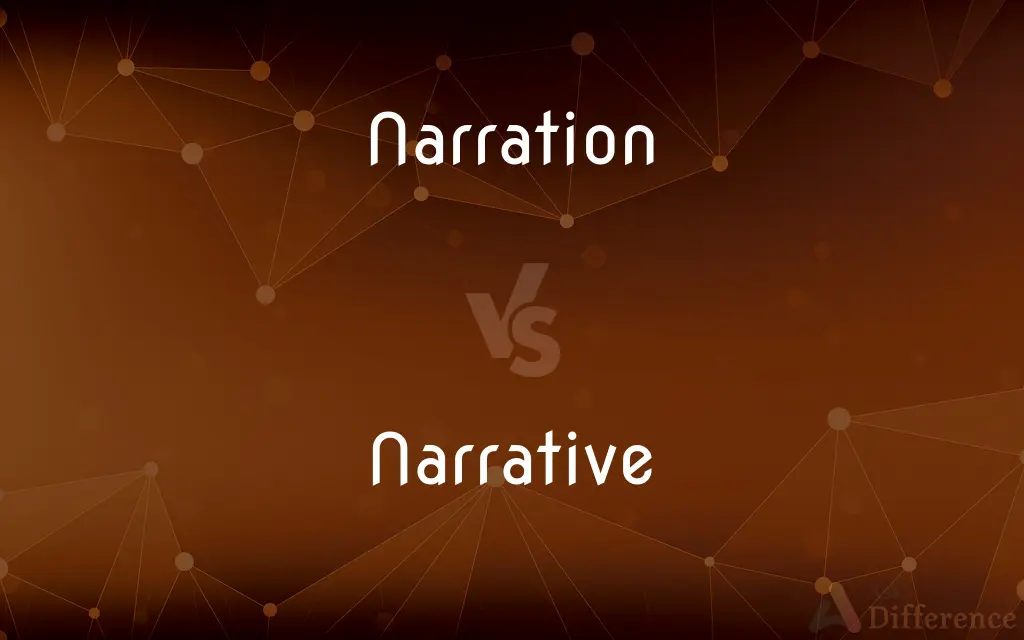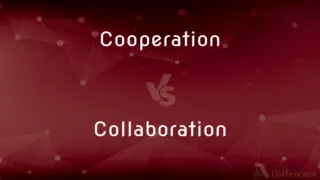Narration vs. Narrative — What's the Difference?
Edited by Tayyaba Rehman — By Fiza Rafique — Updated on March 8, 2024
Narration refers to the act of telling a story or the method by which a story is told, focusing on the perspective and voice, while narrative encompasses the structured sequence of events in a story, including plot and content.

Difference Between Narration and Narrative
Table of Contents
ADVERTISEMENT
Key Differences
Narration is the technique or process through which stories are told, highlighting the perspective from which the story is presented, such as first-person, second-person, or third-person viewpoints. It involves the storyteller's voice and style, which contribute to how the audience perceives and understands the story. On the other hand, narrative refers to the actual content and structure of the story itself, encompassing the sequence of events, characters, settings, and conflicts that make up the plot. While narration focuses on "how" a story is told, narrative is concerned with "what" is told.
The choice of narration can significantly affect the audience's connection with the story, influencing their engagement and empathy towards characters. For example, a first-person narration can offer an intimate glimpse into a character's thoughts and feelings, creating a deep personal connection. Meanwhile, narrative elements like the plot and character development are essential for building the story's framework, guiding the audience through the story's beginning, middle, and end, irrespective of the narration style.
Narration styles can vary widely, from the omniscient narrator who knows all aspects of the story to the unreliable narrator whose credibility is questionable. This choice shapes the tone, atmosphere, and reader's understanding of the story. Conversely, the narrative constructs the foundational elements of the story, such as the setting in time and place, the progression of events, and the interactions between characters, which are crucial for storytelling but independent of the narrator's voice.
While narration is an art that requires skill to manage the delivery and interpretation of a story effectively, narrative structure demands careful planning to ensure the story is coherent, engaging, and fulfilling. A well-crafted narrative provides the backbone upon which the narration builds, offering a clear path for the story to unfold. In contrast, effective narration brings the narrative to life, adding depth, nuance, and personality to the story being told.
In literature, film, and other forms of storytelling, the interplay between narration and narrative is vital for creating memorable and impactful stories. The narration can alter the audience's perception and emotional response to the narrative, and a compelling narrative can provide a rich canvas for the narrator to explore different storytelling techniques. Both elements, while distinct, work in concert to create a complete and immersive storytelling experience.
ADVERTISEMENT
Comparison Chart
Definition
The act or process of telling a story, including perspective and voice.
The content and structure of a story, including plot, characters, and events.
Focus
How a story is told.
What is told in the story.
Key Elements
Perspective (first-person, third-person, etc.), voice, style.
Plot, characters, setting, conflict.
Impact on Audience
Influences engagement, empathy, and perception of the story.
Provides the framework and direction of the story.
Role in Storytelling
Shapes the tone and understanding of the story.
Builds the foundational elements and sequence of events.
Compare with Definitions
Narration
Affects the audience's connection and response to the story.
The intimate narration created a strong emotional bond with the character.
Narrative
The foundation upon which stories are built.
The rich narrative provided a detailed backdrop for the events.
Narration
The method used to tell a story, encompassing the narrator's perspective and voice.
The first-person narration in the novel offers deep insight into the protagonist's thoughts.
Narrative
The structured sequence of events in a story.
The narrative's twist ending left the audience in shock.
Narration
Reflects the storyteller's voice and style.
The author's unique narration style brings humor and lightness to the narrative.
Narrative
Defines the story's beginning, middle, and end.
The narrative's pacing was perfect, keeping readers engaged throughout.
Narration
Can dictate the story's tone and atmosphere.
The omniscient narration provides a comprehensive view of all characters' motivations.
Narrative
Encompasses the conflicts and resolutions experienced by characters.
The central conflict of the narrative drove the plot forward.
Narration
Involves choosing a viewpoint that affects story delivery.
The switch to an unreliable narrator adds complexity and intrigue.
Narrative
Includes characters, settings, and plot developments.
The narrative spanned decades, showcasing the characters' growth.
Narration
Narration is the use of a written or spoken commentary to convey a story to an audience. Narration is conveyed by a narrator: a specific person or unspecified literary voice, developed by the creator of the story, to deliver information to the audience, particularly about the plot (the series of events).
Narrative
A narrative, story or tale is any account of a series of related events or experiences, whether nonfictional (memoir, biography, news report, documentary, travelogue, etc.) or fictional (fairy tale, fable, legend, thriller, novel, etc.). Narratives can be presented through a sequence of written or spoken words, still or moving images, or any combination of these.
Narration
The act, process, or an instance of narrating.
Narrative
The art, technique, or process of narrating
The highest form of narrative.
Narration
Narrated material.
Narrative
(creative writing) A manner of conveying a story, fictional or otherwise, in a body of work.
The plot is full of holes, but the narrative is extremely compelling.
Narration
The act of recounting or relating in order the particulars of some action, occurrence, or affair; a narrating.
Narrative
A narrated account; a story.
Narration
That which is narrated or recounted; an orderly recital of the details and particulars of some transaction or event, or of a series of transactions or events; a story or narrative.
Narrative
A presentation of real-world events that connects them in a storylike way
"There has been less of a coherent, connected media narrative and more of a kind of episodic focus on events, controversies and gaffes" (Mark Jurkowitz).
Narration
(rhetoric) That part of an oration in which the speaker makes his or her statement of facts.
Narrative
An explanation or interpretation of events in accordance with a particular theory, ideology, or point of view
The competing narratives of capitalism and Marxism.
Narration
The act of telling or relating the particulars of an event; a recital of certain events, usually in chronological order; rehearsal.
Narrative
Consisting of or characterized by the telling of a story
Narrative poetry.
Narration
That which is related; the relation in words or writing of the particulars of any transaction or event, or of any series of transactions or events; a narrative; story; history.
Narrative
Of or relating to narration
Narrative skill.
Narration
That part of a discourse which recites the time, manner, or consequences of an action, or simply states the facts connected with the subject.
Narrative
Telling a story.
Narration
The act of giving an account describing incidents or a course of events;
His narration was hesitant
Narrative
Overly talkative; garrulous.
Narration
(rhetoric) the second section of an oration in which the facts are set forth
Narrative
Of or relating to narration.
The narrative thrust of a film
Narrative
The systematic recitation of an event or series of events.
Narrative
That which is narrated.
Narrative
A representation of an event or story in a way to promote a certain point of view.
Changing, controlling the narrative
Narrative
Of or pertaining to narration; relating to the particulars of an event or transaction.
Narrative
Apt or inclined to relate stories, or to tell particulars of events; story-telling; garrulous.
But wise through time, and narrative with age.
Narrative
That which is narrated; the recital of a story; a continuous account of the particulars of an event or transaction; a story.
Cyntio was much taken with my narrative.
Narrative
Consisting of or characterized by the telling of a story;
Narrative poetry
Common Curiosities
What is narration?
Narration refers to the technique or process by which a story is told, including the narrator's perspective and voice.
What elements are included in a narrative?
A narrative includes plot, characters, setting, and conflicts, forming the structured sequence of events in a story.
What is a narrative?
Narrative refers to the content and structure of a story, including the sequence of events, characters, and plot.
Can the style of narration change the understanding of a narrative?
Yes, the style of narration can significantly alter the audience's understanding and emotional response to the narrative.
How do different narrations influence the tone of a story?
The choice of narrator and their perspective can significantly influence the tone, making it humorous, serious, intimate, or detached, among other tones.
Can a narrative exist without narration?
In a sense, a narrative can be outlined or written down as a series of events, but it requires narration to be conveyed or experienced as a story.
How does narration affect a story?
Narration influences the audience's engagement, empathy, and perception of the story through the choice of perspective and voice.
How do first-person and third-person narrations differ?
First-person narration is told from the viewpoint of a character within the story, offering a personal perspective, while third-person narration provides an outside perspective, which can be limited to one character's thoughts or omniscient.
Is narration more important than narrative?
Both are equally important; narration affects how a story is perceived, while narrative is the foundation of the story itself.
What role does conflict play in a narrative?
Conflict drives the narrative forward, creating tension and challenges for the characters to overcome, essential for plot development.
How can an unreliable narrator affect a narrative?
An unreliable narrator can introduce ambiguity and complexity, challenging the audience's perception and interpretation of the story.
Can the same narrative be told with different narrations?
Yes, the same narrative can be experienced differently through various narrations, offering new insights and perspectives.
What is the relationship between narration and narrative in film?
In film, narration might involve voice-over or the perspective from which the story is shown, while the narrative includes the visual and plot elements that tell the story.
Why is narrative structure important?
Narrative structure ensures the story is coherent, engaging, and fulfills the audience's expectations, guiding them through the beginning, middle, and end.
Share Your Discovery

Previous Comparison
Cooperation vs. Collaboration
Next Comparison
Townhouse vs. VillaAuthor Spotlight
Written by
Fiza RafiqueFiza Rafique is a skilled content writer at AskDifference.com, where she meticulously refines and enhances written pieces. Drawing from her vast editorial expertise, Fiza ensures clarity, accuracy, and precision in every article. Passionate about language, she continually seeks to elevate the quality of content for readers worldwide.
Edited by
Tayyaba RehmanTayyaba Rehman is a distinguished writer, currently serving as a primary contributor to askdifference.com. As a researcher in semantics and etymology, Tayyaba's passion for the complexity of languages and their distinctions has found a perfect home on the platform. Tayyaba delves into the intricacies of language, distinguishing between commonly confused words and phrases, thereby providing clarity for readers worldwide.
















































